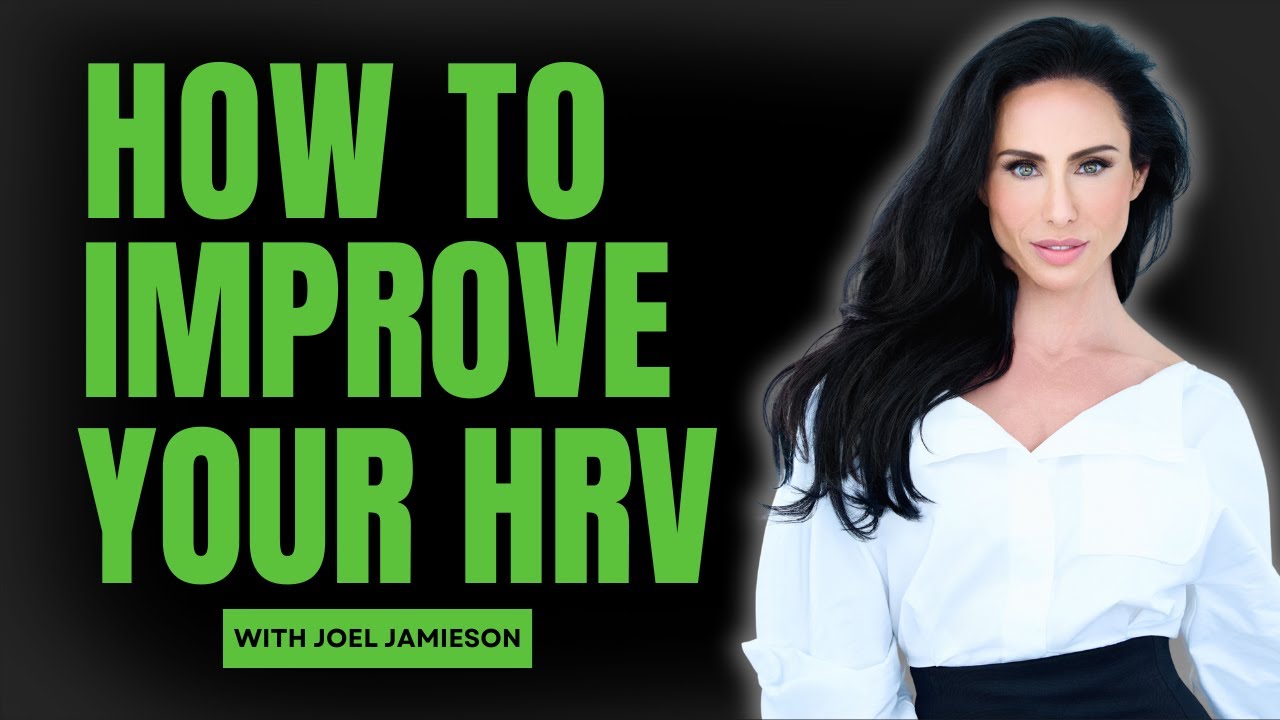- Understanding Heart Rate Variability (HRV) and its role in health and performance.
- Links between HRV, metabolic health, and insulin sensitivity.
- Strategies to enhance HRV through lifestyle, exercise, and nutrition.
- The scientific basis for HRV improvements and overall cardiovascular health.
- Practical tips from Joel Jamieson to implement HRV-focused interventions in daily life.
Heart Rate Variability (HRV) is a crucial indicator of overall health and performance. It measures the fluctuations in the intervals between consecutive heartbeats, reflecting the autonomic nervous system’s regulation. Higher HRV typically indicates a well-balanced autonomic nervous system, signifying a body capable of responding effectively to stressors. HRV offers insights into cardiovascular fitness, endurance, and stress resilience.
The link between HRV, metabolic health, and insulin sensitivity is well-established. A higher HRV is often associated with better metabolic function and enhanced insulin sensitivity. These factors play critical roles in maintaining energy balance and reducing the risk of metabolic diseases such as diabetes and obesity. Improved HRV correlates with a more efficient cardiovascular system and improved glucose uptake, contributing to overall metabolic health.
Enhancing HRV involves several lifestyle and nutritional strategies. Regular physical activity, especially aerobic exercises, has been shown to increase HRV by boosting cardiovascular efficiency and enhancing the autonomic nervous system’s regulation. Activities such as yoga and deep-breathing exercises also improve HRV by reducing sympathetic dominance and promoting parasympathetic activity. Sleep quality is paramount; consistent, restorative sleep patterns bolster HRV and recovery.
Nutrition plays a pivotal role in improving HRV. Diets rich in antioxidants, omega-3 fatty acids, and fiber support heart health and can positively influence HRV. Consuming a balanced diet with adequate nutrients helps regulate blood sugar levels, reducing the burden on the cardiovascular system. Avoiding processed foods high in sugars and unhealthy fats is vital, as they can diminish insulin sensitivity and negatively affect HRV.
The scientific understanding of HRV provides a foundation for these recommendations. HRV is intimately related to the body’s capacity to handle stress and recover, directly impacting performance and overall health. Studies show that individuals with higher HRV exhibit better endurance, adaptability to training loads, and stress management. This makes HRV a valuable biomarker for athletes and health-conscious individuals alike.
Joel Jamieson, a notable figure in the fitness community, offers practical tips for enhancing HRV. He champions the integration of consistent, low-intensity exercise, strategic recovery protocols, and mindful practices into daily routines. Jamieson emphasizes the importance of monitoring HRV to guide training intensity and recovery, ensuring the body adapts without undue stress. His approach empowers individuals to optimize performance by paying attention to their body’s signals and adjusting behaviors accordingly.
By incorporating these principles, individuals can take significant strides in improving their HRV, ultimately fostering better health and performance outcomes. Understanding the interplay between lifestyle, nutrition, and cardiovascular function cultivates a proactive approach to health management, emphasizing the importance of balanced autonomic regulation and its impacts on overall well-being.
*****
Source Description
When it comes to performance, more isn’t always better. In this episode, I sit down with conditioning expert Joel Jamieson to explore the science of recovery, aerobic fitness, and how to use heart rate variability (HRV) to train smarter. They dive into why elite athletes recover so quickly, the long-term value of zone 2 training, and how HRV reflects your resilience—not just your readiness. Joel shares lessons from two decades of working with fighters, Olympians, and NFL players, along with powerful insights from his own cardiovascular health journey. Whether you’re a high performer or simply want to live longer and stronger, this episode is packed with practical takeaways.
In this episode, you’ll learn:
What HRV actually tells you—and what it doesn’t
Why aerobic fitness is one of the strongest drivers of recovery and longevity
The surprising downside of too much strength training
How to monitor training load and avoid overtraining
Why lifestyle stress matters more than your workout
This episode will change the way you think about training—and reveal why recovery deserves a central role in your performance strategy.
Who is Joel Jamieson?
Joel Jamieson is a leading coach and educator in recovery-based training and heart rate variability (HRV). With over 20 years of experience working with professional athletes, including NFL players and world champion fighters, he’s known for translating complex performance science into practical tools. He’s the creator of Morpheus, a system that helps tailor training to daily recovery status, and the founder of 8WeeksOut, a resource for conditioning and performance education.
This episode is brought to you by:
Puori – Code DRYLYON to get 20% off sitewide – https://Puori.com/DRLYON
MUDWTR – Code DRLYON to get up to 43% off your starter kit – https://mudwtr.com/DRLYON
BON CHARGE – Code DRLYON to get 15% off your entire order – https://boncharge.com/DRLYON
ARMRA – Code DRLYON to get 15% off your first order – https://tryarmra.com/DRLYON
Find Joel Jamieson at:
Instagram: @coachjoeljamieson
8WeeksOut: https://8weeksout.com/
Morpheus: https://trainwithmorpheus.com/
Find Me At:
Instagram:@drgabriellelyon
TikTok: @drgabriellelyon
Facebook: facebook.com/doctorgabriellelyon
YouTube: youtube.com/@DrGabrielleLyon
X (Twitter): x.com/drgabriellelyon
Apply to become a patient – https://drgabriellelyon.com/new-patient-inquiry/
Join my weekly newsletter – https://institute-for-muscle-centric-medicine.ck.page
Get my book – https://drgabriellelyon.com/forever-strong/
Timestamps:
0:00 – Intro: Why recovery matters more than you think
4:10 – Joel’s early coaching career and discovery of HRV
9:45 – Lessons from training world-class combat athletes
14:50 – What HRV really measures—and what it doesn’t
20:00 – Genetic advantages: Why elite athletes recover faster
24:05 – Aerobic fitness as the foundation for recovery and longevity
28:40 – How to improve HRV with zone 2 and low-intensity training
35:15 – Joel’s personal heart health wake-up call
43:10 – Why bloodwork isn’t enough: What CT angiograms can reveal
50:20 – Lifestyle stress vs. training stress: What matters more
57:00 – The limitations of wearables and how to use HRV properly
1:03:45 – Cold plunges, breathwork, and the two types of recovery
1:11:05 – The real-world data: Why most people train too hard
1:17:30 – Final thoughts on resilience, training smarter, and the future of recovery
Disclaimer: The Dr. Gabrielle Lyon Podcast and YouTube are for general information purposes only and do not constitute the practice of medicine, nursing, or other professional health care services, including the giving of medical advice, and no doctor/patient relationship is formed. The use of information on this podcast, YouTube, or materials linked from this podcast or YouTube is at the user’s own risk. The content of this podcast is not intended to be a substitute for professional medical advice, diagnosis, or treatment. Users should not disregard or delay in obtaining medical advice for any medical condition they may have and should seek the assistance of their health care professional for any such conditions.
Music from #InAudio: https://inaudio.org/
Mind Gamer (Trap) – Infraction


